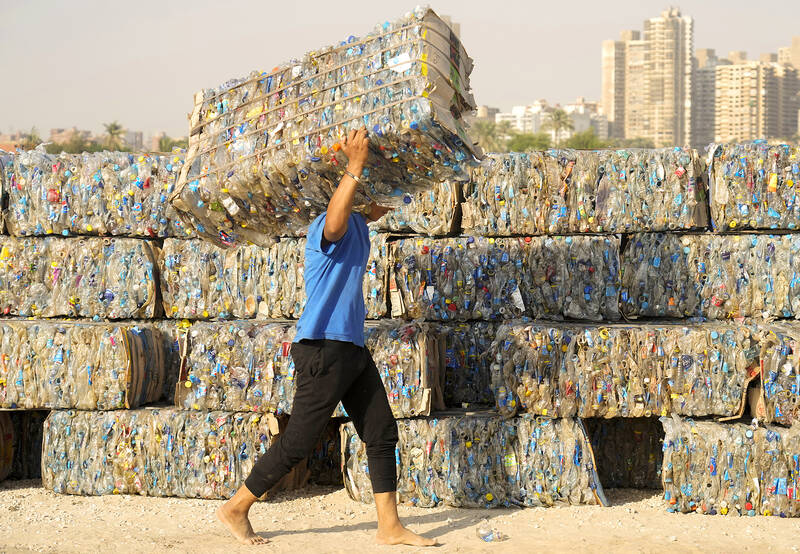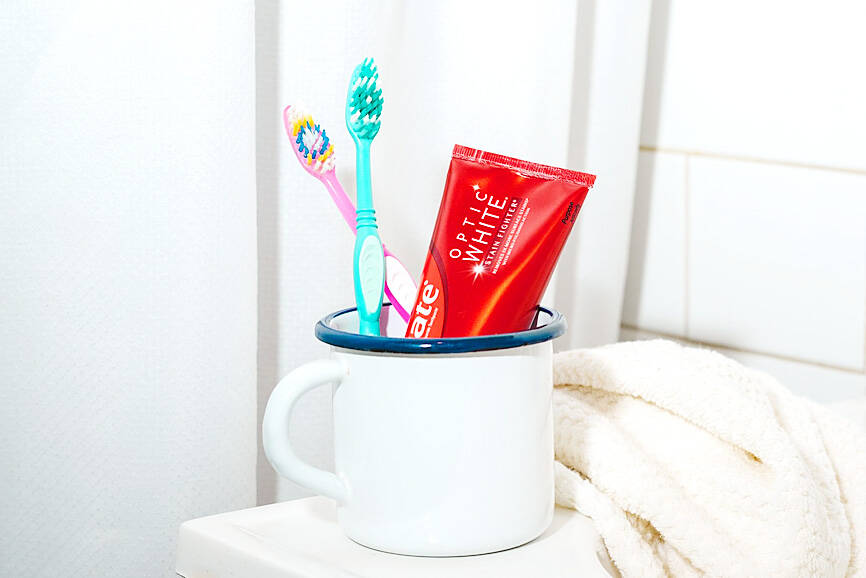Colgate-Palmolive Co spent years devising a recyclable toothpaste tube. Pulling it off was a technical masterstroke, substituting plastic for a mix of materials that was historically tough to reclaim. The result was “nice squeezability,” one executive said.
One big problem remains: Many sorting centers in the US and elsewhere do not accept them.
The gap between Colgate’s engineering success and the practicalities of where-do-we-toss-our-empties underscores a persistent challenge for the corporate US: Switching to packaging that can bypass landfills is not enough if there is no easy way to recycle it. In Colgate’s case, that is 9 billion tubes a year requiring extra effort to avoid the trash heap.

Photo: AP
The new tubes, which cover 78 percent of the company’s US toothpaste lineup, are made with high-density polyethylene (HDPE), the recyclable plastic used for products such as milk jugs.
In the fragmented US system, however, companies making recyclable products have to persuade a wide range of stakeholders, from local governments to private companies, to accept the items, sort them and turn them into something new. It is a process that can take years. The tubes are still not classified as recyclable by How2Recycle, an organization that issues standardized labels with instructions on how to dispose of packaging.
Goods eligible for collection vary by community, and an estimated 40 million US households do not have access to recycling services from their homes. This all means that plastics get reclaimed at rates of only 8 to 28 percent, depending on the type.

Photo: Bloomberg
In light of the challenge, Colgate said it has engaged players across the supply chain for years. It has also shared its new tube design with other companies, and said competitors would adopt similar recyclable plastic tubes by 2025.
“It is not easy work, given the many aspects of the process, but we are committed, and we believe we are on the right path,” Colgate said.
The company has pledged to shrink its plastic waste and use “100 percent recyclable, reusable or compostable plastic packaging by 2025,” it said.
Sarah Dearman, chief innovation officer at the Recycling Partnership, an industry-funded group working to improve the system, said the new tubes are “a great step.”
However, consumers must also have access to collection systems that accept the tube.
It is not clear how many do, nationwide assessment by the Sustainable Packaging Coalition, an industry working group said.
Colgate said the tube has a third-party certification showing it can be processed alongside HDPE bottles, which 87 percent of Americans can put in recycling bins.
That type of plastic ends up being recycled nearly 30 percent of the time, one of the highest rates among recyclable materials in the US.
However, Colgate said that acceptance might still be limited and advised consumers to check with local community programs.
The company started updating the artwork on its boxes to provide more information.
Some consumers are taking note.
Ethan Helvering, a tech worker living in Los Angeles, said he was looking for sustainable toothpaste alternatives when he stumbled upon Colgate’s new tube. He sees recyclability as a selling point and is glad to see the company’s efforts, although he has questions about what ultimately happens.
“If there’s an option to put something in the recycling, I’ll do it,” Helvering said. “Hopefully processes improve and at some point it becomes an actual reality.”
Colgate’s new tubes usually get sorted to the correct group once they reach plants that recover materials and bundle similar plastics together, a test commissioned by the company showed.
However, most US recovery facilities do not take tubes because the recyclable and traditional versions are so similar, said Sandeep Kulkarni, a technical consultant at the Association of Plastic Recyclers, a trade group.
The old tubes could cause contamination if consumers put them in the recycling bin, so it is still easier for recycling facilities to reject toothpaste tubes across the board, he said.
Waste Management Inc, which offers recycling and disposal services, said the tubes are not in its list of acceptable items.
Another concern is leftover toothpaste causing contamination, said Pete Keller, an executive at waste disposal company Republic Services Inc.
It is another area that seems to have discrepancies: On its Web site, Colgate says any residual toothpaste in the tubes is removed during the rinsing process at recycling facilities.
Together, Waste Management and Republic Services run about one-quarter of US materials-recovery facilities tracked by the Recycling Partnership, which said processing capacity is also an important factor.
Sander Defruyt, who leads a plastics-reduction initiative at the Ellen MacArthur Foundation, said that given the challenges of recycling, companies should invest more in alternatives such as reusable containers and packaging.

KEEPING UP: The acquisition of a cleanroom in Taiwan would enable Micron to increase production in a market where demand continues to outpace supply, a Micron official said Micron Technology Inc has signed a letter of intent to buy a fabrication site in Taiwan from Powerchip Semiconductor Manufacturing Corp (力積電) for US$1.8 billion to expand its production of memory chips. Micron would take control of the P5 site in Miaoli County’s Tongluo Township (銅鑼) and plans to ramp up DRAM production in phases after the transaction closes in the second quarter, the company said in a statement on Saturday. The acquisition includes an existing 12 inch fab cleanroom of 27,871m2 and would further position Micron to address growing global demand for memory solutions, the company said. Micron expects the transaction to

Vincent Wei led fellow Singaporean farmers around an empty Malaysian plot, laying out plans for a greenhouse and rows of leafy vegetables. What he pitched was not just space for crops, but a lifeline for growers struggling to make ends meet in a city-state with high prices and little vacant land. The future agriculture hub is part of a joint special economic zone launched last year by the two neighbors, expected to cost US$123 million and produce 10,000 tonnes of fresh produce annually. It is attracting Singaporean farmers with promises of cheaper land, labor and energy just over the border.

US actor Matthew McConaughey has filed recordings of his image and voice with US patent authorities to protect them from unauthorized usage by artificial intelligence (AI) platforms, a representative said earlier this week. Several video clips and audio recordings were registered by the commercial arm of the Just Keep Livin’ Foundation, a non-profit created by the Oscar-winning actor and his wife, Camila, according to the US Patent and Trademark Office database. Many artists are increasingly concerned about the uncontrolled use of their image via generative AI since the rollout of ChatGPT and other AI-powered tools. Several US states have adopted

A proposed billionaires’ tax in California has ignited a political uproar in Silicon Valley, with tech titans threatening to leave the state while California Governor Gavin Newsom of the Democratic Party maneuvers to defeat a levy that he fears would lead to an exodus of wealth. A technology mecca, California has more billionaires than any other US state — a few hundred, by some estimates. About half its personal income tax revenue, a financial backbone in the nearly US$350 billion budget, comes from the top 1 percent of earners. A large healthcare union is attempting to place a proposal before